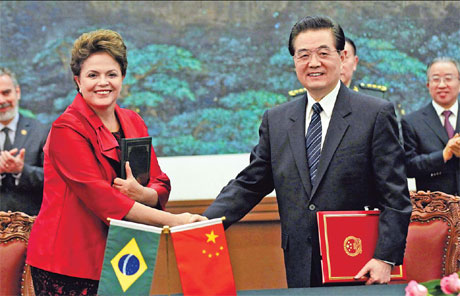|
|

|
|
President Hu Jintao shakes hands with Brazilian President Dilma Rousseff during a signing ceremony at the Great Hall of the People in Beijing on Tuesday.[Photo / China Daily] |
Presidents hail strategic partnership as key deals and agreements signed
BEIJING - China pledged to diversify its trade with Brazil and boost imports from South America's biggest economy, as Brazilian President Dilma Rousseff began her debut presidential trip outside Latin America on Tuesday.
President Hu Jintao and Rousseff signed a joint communique, which included China's pledge to diversify trade, after talks at the Great Hall of the People. Both Hu and Rousseff praised the strategic partnership of the two countries.
Both countries agreed to promote the registration of Brazil's poultry and beef companies and vowed to quicken procedures to add new products onto their import and export lists.
The products include gelatin, corn, tobacco leaf, bovine embryos and semen and fruit from Brazil as well as fruit from China.
The two countries also called for the Doha trade talks to produce comprehensive and balanced results that address the concerns of the world's least developed countries, Xinhua said.
The Doha talks have stalled repeatedly since their start. Some countries earlier identified 2011 as a "window of opportunity" and a chance to secure an agreement.
China and Brazil agreed to work more closely on reforming international financial and monetary systems under the G20 framework, the communique said.
Under the communique, both countries called for increased supervision to avoid new crises while working toward global economic recovery.
Earlier on Tuesday, Chinese and Brazilian companies signed 13 deals and cooperation documents. These included the purchase of 35 E190 planes by Chinese airlines from Brazilian aircraft manufacturer Embraer, worth about $1.4 billion.
The purchase will result in State-owned China Southern Airlines getting 20 of the planes and Hebei Airlines, a regional carrier based in northern China, getting 15. The aircraft can seat 98 to 114 people.
About 80 Embraer planes are currently in operation in China.
Embraer, the third largest global airplane manufacturer behind Boeing and Airbus, was also set to sign an agreement with the State-owned Aviation Industry Corporation of China to manufacture the firm's Legacy 600 business jet, Brazilian officials told AFP.
Brazil's national electric company, Eletrobras, and state-run energy giant Petrobras also signed deals with their Chinese partners.
The two presidents on Tuesday night also witnessed the signing ceremony of eight other cooperation documents, including one on defense signed by the defense minister and Brazil's foreign minister. No details of the agreements were released.
Hu said in the talks that "the China-Brazil strategic partnership has become a successful example of South-South cooperation and has an increasing global impact and strategic significance", according to a press release issued by the Foreign Ministry.
To establish and develop a partnership with China is "Brazil's strategic choice", Rousseff told Hu.
The two state heads pledged to deepen cooperation on global affairs and push for the interests of developing nations in global politics and economics.
Beijing's promise on trade diversification is likely to ease Brazil's concerns over its lack of industrial commodities exports to China, a top priority for Rousseff on her trip, which the Wall Street Journal called "a trade mission".
An estimated 250 Brazilian executives from key firms have followed Rousseff on the visit, her first beyond Latin America since she took office on Jan 1.
China has surpassed the United States to be Brazil's top trading partner.
Trade volume between the two nations reached $56 billion in 2010, with a surplus of more than $5 billion on the Brazilian side.
China in 2010 was also the largest investor in the South American nation, pumping in some $30 billion.
"Although Brazil enjoys a surplus, it is very clear some of its sectors are not at an advantage when trading with us. It is a structural problem," He Shuangrong, a professor at the Institute of Latin American Studies at the Chinese Academy of Social Sciences, told China Daily.
She said governmental agreements cannot fundamentally solve the problem but actual economic requirements from both sides will determine future trade.
"Rousseff's domestic strategy puts more stress on domestic manufacturing and employment, but it is not imports from China or the currency rate that will affect trade but rather the competence of Brazilian industry."
Rousseff will fly to the southern resort city of Sanya on Wednesday to join leaders of Russia, India, and South Africa for a summit of the BRICS group of emerging countries.
The visit suggests that Rousseff "has an international agenda that favors its main economic partners", Joao Augusto de Castro Neves, an analyst at the political consultancy CAC, told AFP.
China Daily
|